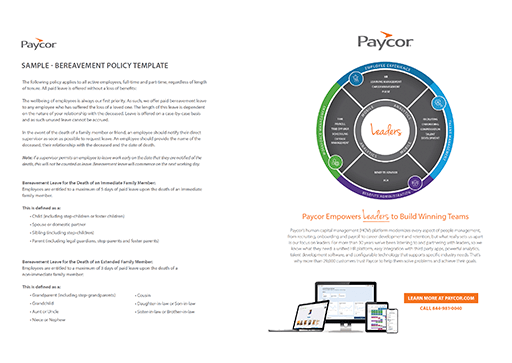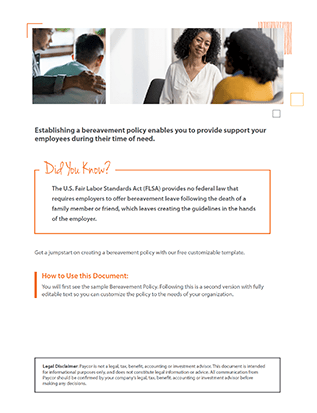How to Create a Bereavement Leave Policy
A bereavement policy describes your company’s practices for allowing paid and unpaid time off when a family member, relative, or friend dies. SHRM reports that 88% of companies offer bereavement policies. Three to five days’ off is standard but there are no federal laws that mandate an employer offer bereavement leave. Oregon is the only state that requires employers to offer time off (although it doesn’t have to be paid time off). Some companies are pioneering much more generous policies, like Facebook, which offers 20 paid days off for bereavement.
When crafting a bereavement policy, HR leaders will have to balance what their company can offer with the emotional and practical needs of the employee. At minimum, a good policy will provide enough time for employees to:
- Make funeral arrangements
- Pay their respects to the deceased person’s family at a wake or visitation
- Attend the funeral and burial
- Handle the deceased person’s belongings and will
- Any other matters that they need to deal with after a death
- The chance to take time off down the road, as it often takes time to process grief in a healthy way
What is Bereavement Leave?
Bereavement leave is a leave of absence from work granted to an employee who has suffered the loss of a spouse, domestic partner, child, parent, sibling, or anyone in their immediate family who they live with.
Bereavement leave allows employees time to mourn the death of a loved one by attending the memorial services and attending to their bereavement-related needs.
Is Bereavement Leave Required by Law?
There is no federal law that requires employers to provide days of bereavement leave for their employees, but many states have laws that require employers to provide some amount of unpaid leave for employees who have lost a loved one.
When you allow your employees time to grieve, it shows that they are valued and respected. It can be difficult for someone who has lost a loved one but giving them this space allows them some much-needed privacy.
Are All Employees Entitled to Bereavement Leave?
Not all employees are necessarily entitled to paid bereavement leave, but those who live in states with bereavement leave laws may be eligible for unpaid leave. Additionally, many employers choose to offer bereavement leave as part of their employee benefits package.
Are Employers Required to Offer Bereavement Leave?
The U.S. Fair Labor Standards Act (FLSA) provides no federal law that requires employers to offer bereavement leave following the death of a family member or friend, which leaves creating the guidelines in the hands of the employer.
Some states do mandate that employers provide bereavement leave. Oregon, for example, was the first state to require companies to offer extended bereavement leave in 2014. They now include two weeks of bereavement leave in their state family and medical leave statutes.
If your company doesn’t already have a policy in place, keep reading to find out what goes into implementing an effective one.
How Long is Bereavement Leave?
Most businesses offer company paid bereavement leave of three to five days after the death of an immediate family member. In the case of other relatives and friends, the typical paid bereavement leave is just one day off.
The reduction in paid time off is because less personal time should be needed for distant relatives or friends beyond attending the funeral or memorial service.
When Should You Offer More Time Off?
Sometimes an employee is required to put in more time and effort after a death, especially if they are the executor of the will or the estate is particularly complex. Appointments with attorneys, realtors and estate sale agents can be time-consuming and may take weeks or even months to wrap up. Another complicating factor is if the deceased person lived in another city or state. In this case, extra time off will be required, so most companies also include a section about unpaid leave in their bereavement policies.
FMLA and Bereavement Leave
It’s important to note that if an employee still needs additional time following a death in the family, unfortunately, FMLA doesn’t cover it. However, if the employee needs to attend grief counseling or therapy to help them cope with the death, that can be covered under FMLA.
How Paycor Helps
Establishing a policy doesn’t have to be difficult, it is actually very helpful in setting expectations. Get started with our customizable template we’ve provided for you.











